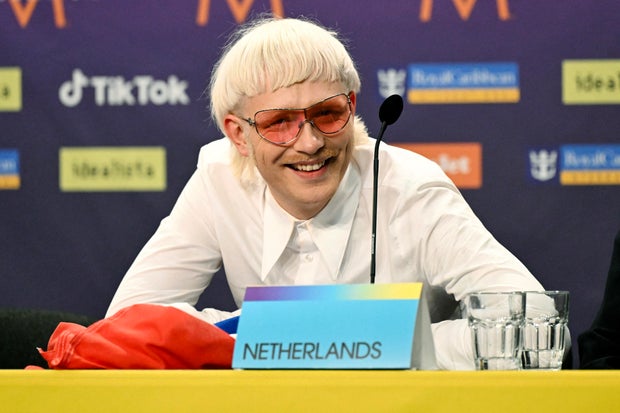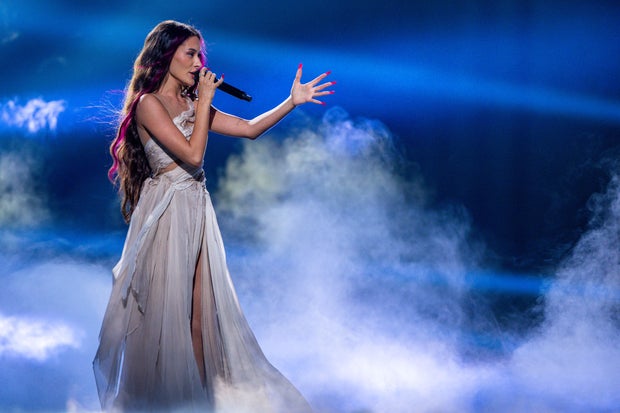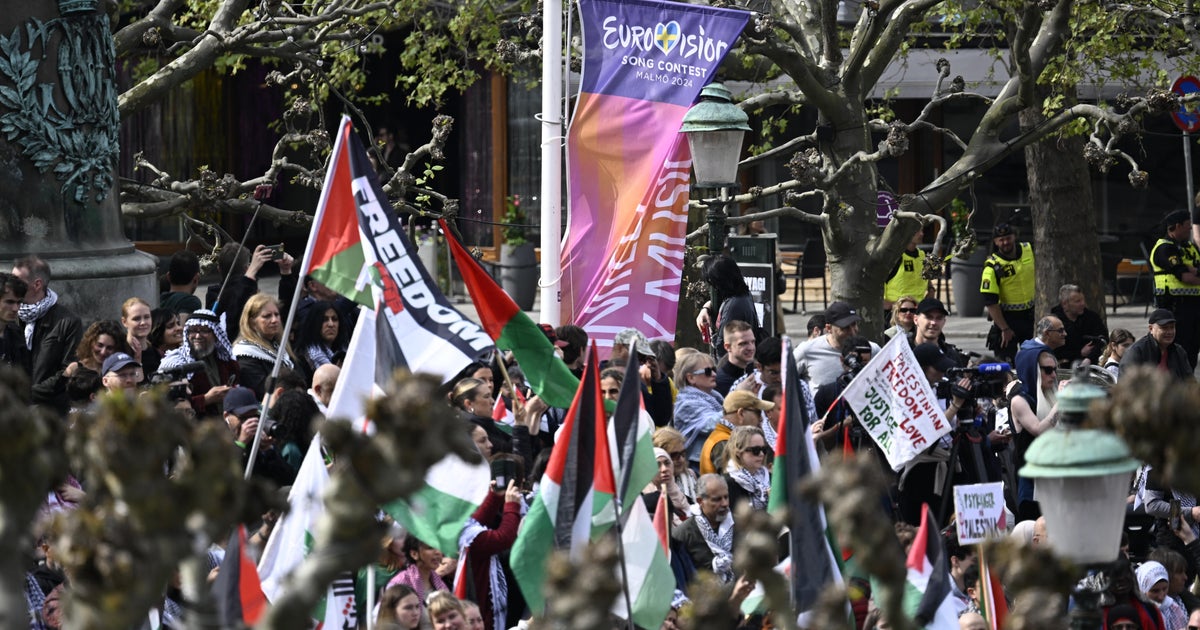CBS News
Dutch contestant Joost Klein kicked out of Eurovision hours before contest final

The Netherlands’ contestant in the Eurovision Song Contest was expelled from competition hours before Saturday’s final of the pan-continental pop competition, which has been rattled by protests over the participation of Israel.
Competition organizer the European Broadcasting Union said Swedish police were investigating “a complaint made by a female member of the production crew” against Dutch performer Joost Klein. The organizer said it wouldn’t be appropriate for Klein to participate at the event while the legal process was underway.
Though Eurovision’s motto is “united by music,” this year’s event has proven divisive. Israel’s participation has attracted large pro-Palestinian demonstrations, with protesters saying the country should be excluded because of its conduct in the war in the Gaza Strip.
Klein, a 26-year-old Dutch singer and rapper, had been a favorite of both bookmakers and fans with his song “Europapa.”
He failed to perform at two dress rehearsals on Friday, and the EBU had said it was investigating an “incident.” Dutch broadcaster AVROTROS, one of dozens of public broadcasters that collectively fund and broadcast the contest, said that as Klein came offstage after Thursday’s semifinal he was filmed without his consent and in turn made a “threatening movement” toward the camera.
The broadcaster said Klein didn’t touch the camera or the female camera operator, and called his expulsion “very heavy and disproportionate” punishment.
Jessica Gow via Getty Images
Some music lovers in the Eurovision fan park expressed dismay at the Dutch expulsion. Sven Sherman from Sweden said it was a “pity that a song which is absolutely made for Europe” is now disqualified.
“I mean, honestly, which country has done so much, many good things for Europe, like the Netherlands? So it’s really a pity and I hope next year they will be back again,” he said.
It all makes for a messy climax to an event that draws both adoration and derision with its campy, kitschy ethos and passion for pop.
Tensions and nerves were palpable in the hours before the final, where 25 acts – narrowed from 37 entrants by two semifinal runoffs – are due to perform three-minute songs in front of a live audience of thousands and an estimated 180 million viewers around the world.
Several artists were absent from the Olympics-style artists’ entrance at the start of the final dress rehearsal, though all but Ireland’s Bambie Thug went on to perform.
The Irish performer issued a statement saying the absence was due to a situation “which I felt needed urgent attention from the EBU” and telling fans: “I hope to see you on the stage later.”
Jens Battner via Getty Images
French singer Slimane cut short his song “Mon Amour” at the dress rehearsal to give a speech urging people to be “united by music, yes – but with love, for peace.”
The offstage drama is overshadowing a competition whose entries range from emotional to eccentric. They include the goofy 1990s nostalgia of Finland’s Windows95man, who emerges from a giant onstage egg wearing very little clothing. Bambie Thug summons witchy spirits onstage and has brought a scream coach to Malmo, while Spain’s Nebulossa boldly reclaims a term used as a slur on women in “Zorra.”
The favorites include Swiss singer Nemo – who would be the first nonbinary Eurovision winner if their operatic song “The Code” tops the voting – and Croatia’s Baby Lasagna. His song “Rim Tim Tagi Dim” is a rollicking rock number that tackles the issue of young Croatians leaving the country in search of a better life.
Dean Vuletic, an expert on the history of the contest, said that despite the contest’s reputation for disposable bubblegum pop, Eurovision often tackles “political and social issues such as feminism, European integration, gender identity.”
Sometimes, though, songs run afoul of the contest’s ban on openly “political” statements. Eurovision organizers told Israel to change the original title of its song, “October Rain” – an apparent reference to the Oct. 7 Hamas attack that killed about 1,200 people in Israel and triggered the war in Gaza.
Israeli singer Eden Golan has shot up the odds since performing the power ballad, now titled “Hurricane,” in Thursday’s semifinal. Golan faced some booing at dress rehearsals, but was voted into the final by viewers around the world.
Jens Battner via Getty Images
Israeli Prime Minister Benjamin Netanyahu praised 20-year-old Golan for performing despite “contending with an ugly wave of antisemitism.”
Pro-Palestinian protesters argue that Israel shouldn’t be allowed to take part amid a war that has killed almost 35,000 Palestinians, according to the health ministry in the Hamas-run territory.
Thousands of people marched for the second time this week on Saturday through Sweden’s third-largest city, which has a large Muslim population, to demand a boycott of Israel and a cease-fire in the seven-month war.
A few Palestinian flags were waved in the auditorium during Saturday’s Eurovision dress rehearsal, in defiance of a ban on flags other than those of competing nations.
The competing musicians are feeling the pressure, inundated with messages and abuse on social media and unable to speak out because of the contest rules. Italy’s contestant, Angelina Mango, made a statement by walking into the Eurovision media center on Friday and performing John Lennon’s “Imagine” as dozens of journalists gathered around her.
Swedish singer Loreen, last year’s Eurovision champion – and one of only two performers to win the contest twice – said world events were “traumatizing” but urged people not to shut down the “community of love” that is Eurovision.
“What heals trauma … Does trauma heal trauma? Does negativity heal negativity? It doesn’t work like that,” she told The Associated Press. “The only thing that heals trauma for real – this is science – is love.”
CBS News
Gazan chefs cook up hope and humanity for online audience

Watch CBS News
Be the first to know
Get browser notifications for breaking news, live events, and exclusive reporting.
CBS News
Serving up home-cooked dog food

Watch CBS News
Be the first to know
Get browser notifications for breaking news, live events, and exclusive reporting.
CBS News
What makes a martini a martini?

Watch CBS News
Be the first to know
Get browser notifications for breaking news, live events, and exclusive reporting.









